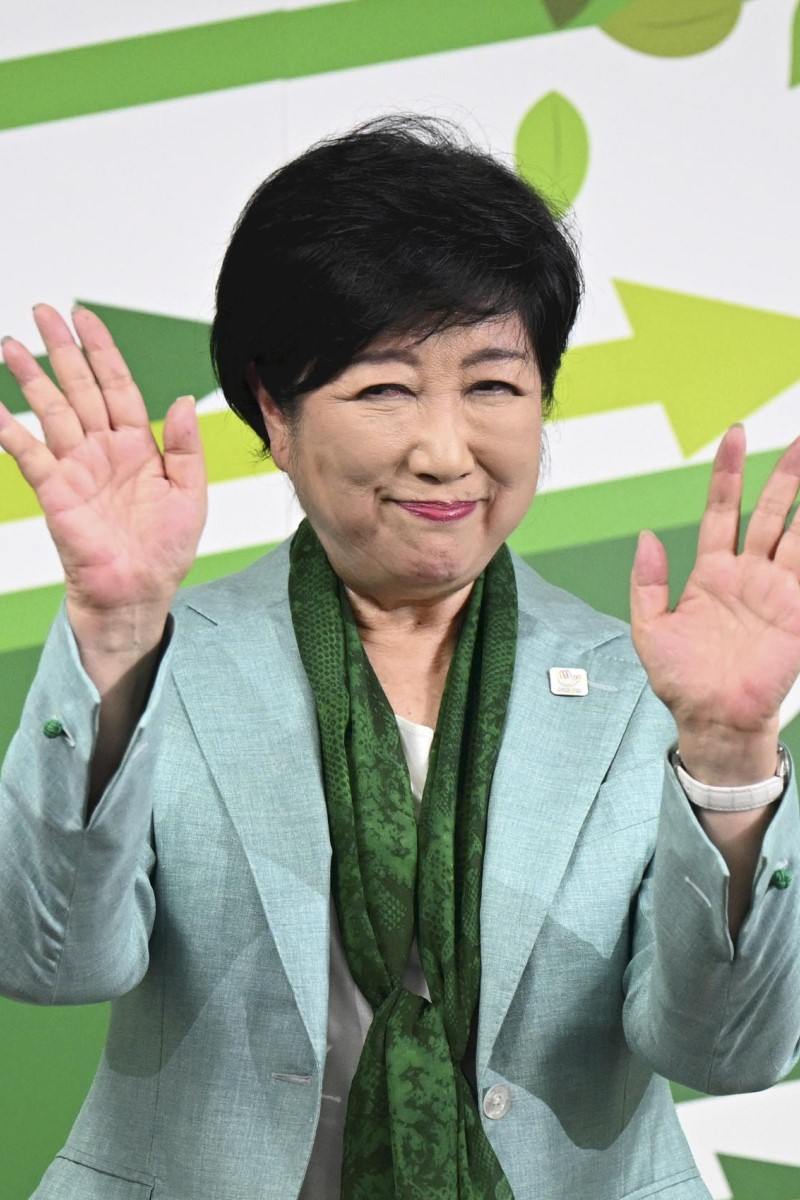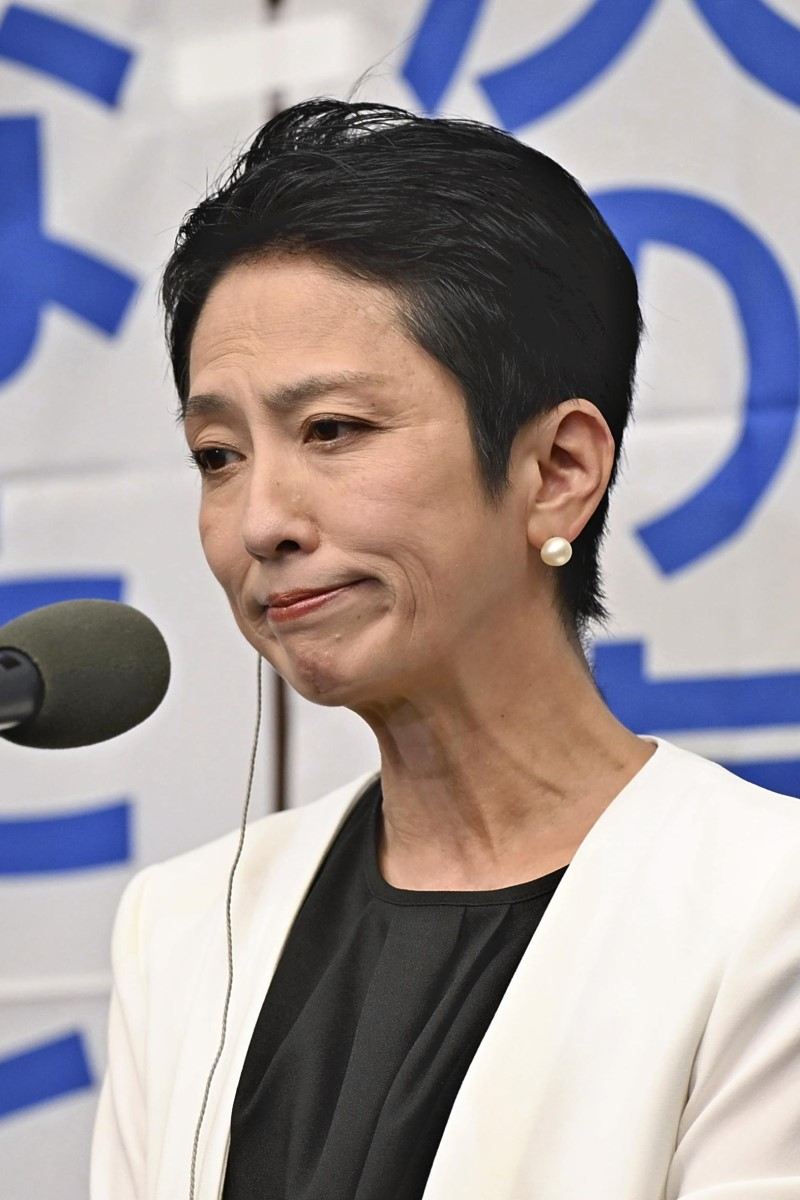

Left: Yuriko Koike waves to supporters after she is projected to win a third term as Tokyo governor at 8:16 p.m. on Sunday in Shinjuku Ward, Tokyo.
Renho answers questions in an interview with a TV program at 8:42 p.m. on Sunday in Chiyoda Ward, Tokyo.
16:06 JST, July 8, 2024
Incumbent Yuriko Koike won the Tokyo gubernatorial election on Sunday, allowing her a third term at the helm of Japan’s capital.
The 71-year-old beat runner-up Shinji Ishimaru, 41, former mayor of Akitakata, Hiroshima Prefecture, and former House of Councillors member Renho, 56, who finished third. The election was contested by a record 56 candidates. Koike will continue to shoulder the response to Tokyo’s declining birth rate and aging population, as well as preparations for a potential earthquake directly under Tokyo.
While she received support from the Liberal Democratic Party and Komeito, Koike tamped down associations with the parties and skillfully dodged moves by her main challenger, Renho, to make the election about the country’s ruling and opposition parties.
Koike had initially planned to announce her candidacy at the beginning of the regular session of the Tokyo metropolitan assembly on May 29. However, when public interest turned to Renho, who announced her candidacy shortly before then, Koike chose to bide her time. She did not make her announcement until the last day of the session on June 12, after the excitement for Renho had cooled down.

Election officials count votes at a municipal gymnasium in Shinagawa Ward, Tokyo, on Sunday.
Even as the campaigns began and the candidates took to the streets, Koike sought to “prioritize the governor’s official duties” and cut back on stump speeches. Instead, she visited nearly 20 sites for inspection, including nursery schools, with reporters in tow to promote her achievements during her two terms and eight years as governor.
It seems she was concerned that if she campaigned on the street, she might have been criticized for neglecting her public duties.
“We tried to fight the race like a yokozuna, taking advantage of the incumbent’s strengths while avoiding losing points and not getting in the same ring as our opponents,” a senior staffer in her camp said.
Meanwhile, the LDP and Komeito worked behind the scenes to consolidate support for Koike. The LDP asked various organizations to support her, while Komeito reached out to the ranks of the lay Buddhist group Soka Gakkai, which is a key supporter of the party. Komeito supported her “on the same footing as an official party candidate,” a Komeito official said.
Koike made 11 stump speeches where she invited Tokyo mayors with weak party affiliations to speak in support of her. In light of the backlash against the LDP for violations of the Political Funds Control Law, Koike never allowed any LDP member to give a speech in her favor. Koike’s success with independent voters can be put down to her rigorous avoidance of party affiliations.
Renho, who left the Constitutional Democratic Party of Japan to run for governor, faced a difficult campaign in which she was forced to rethink her tactics midway through. At first, she launched an anti-LDP campaign, insisting that she would “reset the Koike administration, which is helping to extend the life of the LDP.” But after being knocked on social media for doing nothing but criticizing, Renho was forced to tone down her attacks. “I will continue [Koike’s] good policies,” she said.
Her pledge that she would “show something exciting” also lacked freshness.
“Since we criticized the incumbent for not fulfilling her pledges, we ended up only being able to only present policies that prioritized feasibility,” a person in Renho’s camp lamented.
Toward the end of the campaign, the Renho camp, which had little to offer other than its anti-LDP platform, attempted to sway independent voters through steady outreach, such as by distributing leaflets in front of stations. But her reach was limited, partly due to backing from the Japanese Communist Party.
Concerned about turning away independents, Renho’s camp tried to minimize the opportunities for Renho and JCP members to stand by each other at street speeches, but “voters had seen the strong support she was receiving from the JCP,” a CDPJ official said.
Top Articles in Politics
-

Japan PM Takaichi’s Cabinet Resigns en Masse
-

Sanae Takaichi Elected Prime Minister of Japan; Keeps All Cabinet Appointees from Previous Term
-

Japan’s Govt to Submit Road Map for Growth Strategy in March, PM Takaichi to Announce in Upcoming Policy Speech
-

LDP Wins Historic Landslide Victory
-

LDP Wins Landslide Victory, Secures Single-party Majority; Ruling Coalition with JIP Poised to Secure Over 300 seats (UPDATE 1)
JN ACCESS RANKING
-

Japan PM Takaichi’s Cabinet Resigns en Masse
-

Japan Institute to Use Domestic Commercial Optical Lattice Clock to Set Japan Standard Time
-

Israeli Ambassador to Japan Speaks about Japan’s Role in the Reconstruction of Gaza
-

Man Infected with Measles Reportedly Dined at Restaurant in Tokyo Station
-

Videos Plagiarized, Reposted with False Subtitles Claiming ‘Ryukyu Belongs to China’; Anti-China False Information Also Posted in Japan























